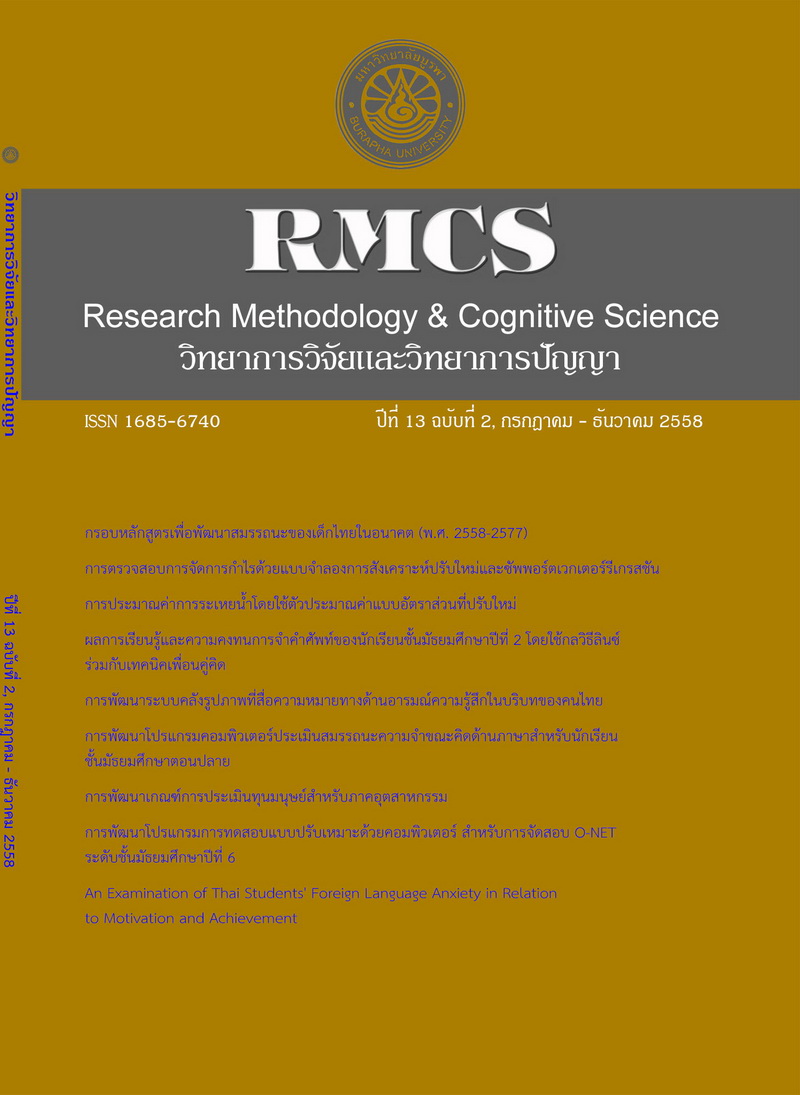กรอบหลักสูตรเพื่อพัฒนาสมรรถนะของเด็กไทยในอนาคต (พ.ศ. 2558-2577)
Main Article Content
Abstract
การวิจัยนี้มีวัตถุประสงค์เพื่อ 1) บรรยายแนวโน้มลักษณะของสังคมไทยในอนาคต 2) กําหนดสมรรถนะ ของเด็กไทยในอนาคตที่พึงประสงค์ (พ.ศ. 2558-2577) และ 3) พัฒนากรอบหลักสูตรเพื่อพัฒนาสมรรถนะของ เด็กไทยในอนาคต การดําเนินงานวิจัยมี 3 ระยะคือ ระยะที่ 1 ทบทวนเอกสารเกี่ยวกับสภาพสังคมไทยในอนาคต ระยะที่ 2 ศึกษาสมรรถนะของเด็กไทยในอนาคตโดยใช้กระบวนการวิจัยอนาคตแบบ EDFR และระยะที่ 3 ออกแบบกรอบหลักสูตรเพื่อพัฒนาสมรรถนะของเด็กไทยในอนาคต ผลการวิจัยปรากฏว่า
สภาพสังคมไทยในอนาคตจะมีการเปลี่ยนแปลง เช่น ครอบครัวจะเล็กลงและมีปัญหาเพิ่มมากขึ้น ภาวะเจริญพันธุ์ลดลง วัยแรงงานลดลง ผู้สูงอายุจะเพิ่มมากขึ้น จะมีความเป็นสังคมเมืองเพิ่มมากขึ้น จะให้ ความสําคัญกับภาษาที่สอง การคอร์รัปชั่นจะยากขึ้น คนจะย้ายเข้ามาอยู่ในเมืองมากขึ้นและวัฒนธรรมต่างชาติจะ ไหลบ่าเข้ามามากขึ้น ภาคอุตสาหกรรมจะนําเทคโนโลยีขั้นสูงมาใช้ แรงงานต้องมีทักษะขั้นสูง จะมีการแข่งขันกับ ต่างประเทศสูงขึ้น ธุรกิจภาคบริการจะเจริญเติบโตเพิ่มขึ้น การเมืองจะมีความเป็นประชาธิปไตยเพิ่มขึ้น วิทยาศาสตร์และเทคโนโลยีจะเข้ามามีบทบาททางด้านการศึกษาเพิ่มมากขึ้น ผู้คนทุกเชื้อชาติสามารถติดต่อ สื่อสารกันได้อย่างไร้พรมแดนและรวดเร็ว จากความเปลี่ยนแปลงที่จะเกิดขึ้นดังกล่าวมานี้ ผู้เชี่ยวชาญได้เสนอ ความคิดเห็นว่า เด็กไทยในอนาคตจะต้องมีสมรรถนะที่พึงประสงค์เพื่อให้อยู่ในสภาพสังคมไทยในอนาคตได้อย่าง ปลอดภัย อยู่2 ประเภทคือ สมรรถนะขั้นพื้นฐานและสมรรถนะที่ทําให้บุคคลแตกต่างจากผู้อื่นซึ่งมีทั้งหมด 5 ด้าน คือ 1) ด้านความรู้2) ด้านทักษะ 3)ด้านมโนทัศน์ หรือความคิดเห็นเกี่ยวกับตนเอง 4) ด้านบุคลิกลักษณะประจําตัว และ 5) ด้านแรงจูงใจ/เจตคติกรอบหลักสูตรเพื่อพัฒนาสมรรถนะของเด็กไทยในอนาคต มีจุดประสงค์เพื่อพัฒนา สมรรถนะของเด็กไทยในอนาคต 3 ด้านคือ ด้านพุทธิพิสัย จิตพิสัย และทักษะพิสัย เนื้อหาสาระในหลักสูตรจะ เกี่ยวกับความรู้ในสาระวิชาหลัก ความรู้สําคัญในการดํารงชีวิต ความรู้เกี่ยวกับทักษะของการดํารงชีวิต ส่วนการ จัดการเรียนการสอนที่เหมาะสมกับการพัฒนาสมรรถนะของเด็กไทยในอนาคตคือ การเรียนรู้ผ่านโครงงาน การเรียนรู้ผ่านปัญหา การเรียนรู้แบบร่วมมือ การเรียนรู้ผ่านประสบการณ์การเรียนรู้ผ่านการลงมือปฏิบัติตาม สภาพจริง วิธีการวัดและประเมินผลที่เหมาะสมจะใช้วิธีการที่หลากหลายทั้งการทดสอบ การประเมินผลงาน การประเมินเชิงการสื่อสาร และจากแฟ้มสะสมผลงาน
Curriculum Framework for Developing Competency of Thai Students in the Future (B.E. 2558-2577)
Sompit Harnmontri, Teerachai Nethanomsak and Chumpol Poolpatarachewin
Faculty of Education, Khon Kaen University, Thailand
This research aims to 1) describe the future trend of Thai society, 2) define the prospective preferable competency of Thai students in the future (B.E.2558-2577), and 3) develop the curriculum framework for developing competency of Thai students in the future. The research was conducted in three phases. Phase I: Reviewed literature about the conditions of Thai society in the future. Phase II: Studied the prospective preferable competency of Thai students in the future by applying EDFR procedure. Phase III: Designed the curriculum framework for developing the competency of Thai students in the future. The research findings were as follows:
Thai society in the future will be changed in many ways, for example, 1) The family will be smaller, 2) The family problems will be more encountered, 3) Birth rate will be reduced, 4) Labour age ranges will be less, 5) There are more old people in the society, 6) Society will be more modernized, 7) The second language will be more important, 8) Corruption will be more difficult, 9) There are more migrations to the urban area, 10) Foreign culture will be increased in Thai society, 11) Higher technology will be applied more in the industry, 12) High-skilled workers will be required, 13) Thailand will be faced with higher competitions with other countries, 14) There are higher service business sectors, 15) Politics will be more democracy, 16) Science and technology will play more roles in education and 17) People all over the world will be able to contact each other freely without boundary. Experts have commented that Thai students in the future should have two categories of competency, which are threshold competency and differentiating competency. Both of them focus on five areas 1) Knowledge, 2) Skills, 3) Selfconcept, 4) Trait, and 5) Motive/ Attitude.
The purposes of the curriculum framework for developing competency of Thai students in the future were for; 1) developing cognitive domain, 2) developing affective domain and 3) developing psychomotor domain. Content in the curriculum will be about knowledge in the core subjects, knowledge for living in the 21st century, and knowledge about three skills for living in the 21st century that are Learning and Innovation skills, Information Media and Technology skills, and Life and Career skills. The suitable methods of teaching are Projectbased Learning, Problem-based Learning, Collaborative Learning, Experience-based Learning and Authentic Learning. The suitable measurement and evaluation were using various methods such as the test, the task, how to communicate and portfolio.

